| Srl | Item |
| 1 |
ID:
171588
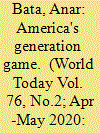

|
|
|
| 2 |
ID:
159618
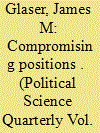

|
|
|
|
|
| Summary/Abstract |
JAMES M. GLASER and JEFFREY M. BERRY seek to explain why Republican legislators are less likely to favor compromise than Democrats. They argue that in their unwillingness to compromise, Republicans respond to the preferences of their constituents.
|
|
|
|
|
|
|
|
|
|
|
|
|
|
|
|
| 3 |
ID:
130279
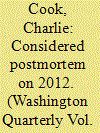

|
|
|
|
|
| Publication |
2013.
|
| Summary/Abstract |
The November 2012 election results revealed and underscored greater changes in American political dynamics than many of us had anticipated. Republicans, who had won the popular vote in four out of the five presidential elections from 1968-1988, have now lost five out of the last six, with 2000 notably featuring a Democratic popular vote win but George W. Bush capturing the Electoral College. Republicans last won 300 or more electoral votes in 1988; Democrats have now exceeded 300 in four of the last six elections, from 1992-2012. Keeping in mind that 270 electoral votes are needed to win, Democrats have now carried 18 states plus the District of Columbia in six consecutive elections, a combination totaling 242 electoral votes-89 percent of the 270 needed to win an election. One can now say that Democrats have a home field advantage in presidential races.
|
|
|
|
|
|
|
|
|
|
|
|
|
|
|
|
| 4 |
ID:
128586
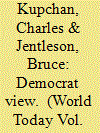

|
|
|
| 5 |
ID:
105425
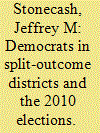

|
|
|
|
|
| Publication |
2011.
|
| Summary/Abstract |
The 2008 congressional elections produced a House in which 84 members came from split-outcome districts. Forty-nine Democrats won in districts that Barack Obama lost, and 35 Republicans won in districts that Obama won. To protect their majority, the Democrats needed to retain these 49 members. Given the party's 257 seats, these split members constituted the difference between being in the majority and the minority. The 49 Democrats faced the dilemma of whether to vote with their party, given that their district voted for the presidential candidate of the other party. The focus here is on these split Democrats: their electoral situation, their votes, and their fate in 2010.
|
|
|
|
|
|
|
|
|
|
|
|
|
|
|
|
| 6 |
ID:
075252
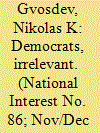

|
|
|
|
|
| Publication |
2006.
|
| Summary/Abstract |
In this election cycle, politicians eschew debate in favor of an all-things-to-all-people foreign policy posture with Democrats mostly offering a kinder, gentler version of the Bush strategy rather than any real alternatives.
|
|
|
|
|
|
|
|
|
|
|
|
|
|
|
|
| 7 |
ID:
116455
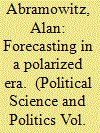

|
|
|
|
|
| Publication |
2012.
|
| Summary/Abstract |
The 2012 presidential campaign takes place at a time of deep political division in the United States. Democrats and Republicans differ sharply over Barack Obama's performance in office as well as a wide range of issues ranging from government spending and health care to immigration and gay marriage. These divisions are shaping the strategies of the candidates and the outlook for November. Overwhelming majorities of Democrats and Republicans, including overwhelming majorities of independents who lean toward a party, can be expected to support their own party's nominee. As a result, the outcome will depend on which party does a better job of mobilizing its supporters and appealing to a small group of swing voters in 10 or 12 battleground states.
|
|
|
|
|
|
|
|
|
|
|
|
|
|
|
|
| 8 |
ID:
126422
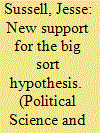

|
|
|
|
|
| Publication |
2013.
|
| Summary/Abstract |
This article empirically examines the "Big Sort hypothesis"-the notion that, in recent years, liberal and conservative Americans have become increasingly spatially isolated from one another. Using block group-, tract-, and county-level party registration data and presidential election returns, I construct two formal indices of segregation for 1992-2010 in California and evaluate those indices for evidence of growth in the segregation of Californians along ideological lines. Evidence of rising geographic segregation between Democrats and Republicans for measures generated from both party registration and presidential vote data is found. This growth is statistically significant for 10 of the 12 segregation measures analyzed. In addition, many of the increases are practically significant, with estimates of growth in segregation during the observation period ranging from 2% to 23%.
|
|
|
|
|
|
|
|
|
|
|
|
|
|
|
|
| 9 |
ID:
131692
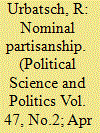

|
|
|
| 10 |
ID:
131672
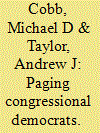

|
|
|
| 11 |
ID:
131674
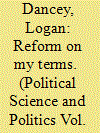

|
|
|
| 12 |
ID:
099531
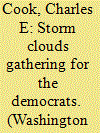

|
|
|
| 13 |
ID:
160803
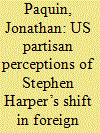

|
|
|
|
|
| Summary/Abstract |
While Stephen Harper’s foreign policy sparked heated debates during his entire tenure as prime minister, these debates were mainly confined to Canadian foreign policy circles. Little attention was paid to allies’ perceptions of these developments and, more specifically, to the perception of the United States, Canada’s main economic and security partner. How did the Bush and Obama administrations perceive these changes? Were they seen as a break from Canada’s past? Did Harper’s handling of foreign policy alter White House calculations with respect to Canada? Based on a series of semi-structured interviews conducted in Washington DC with executive officials a few months prior to the end of the Harper era in 2015, this essay shows that despite a widespread perception in Washington that Canada’s foreign policy approach had changed under Harper, partisanship was the main dividing line in terms of how this approach was perceived and assessed.
|
|
|
|
|
|
|
|
|
|
|
|
|
|
|
|